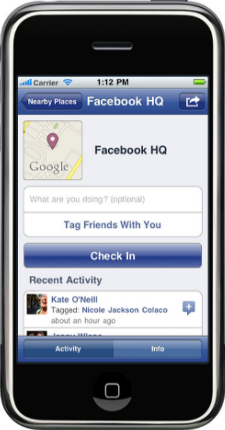 Geolocation is one of the hottest trends in social networking today. Users enjoy connecting with friends at nearby locations. Businesses are beginning to take note of the opportunity to tie their brick-and-mortar locations to their online marketing.
Geolocation is one of the hottest trends in social networking today. Users enjoy connecting with friends at nearby locations. Businesses are beginning to take note of the opportunity to tie their brick-and-mortar locations to their online marketing.
In addition to the main local social networking applications—Foursquare and Gowalla—Google, Facebook and Twitter have added geolocation features to their services to tap into this trend.
As users provide more information about their location, serious privacy implications are beginning to surface. For instance, a Webroot study released in July 2010 found that more than half of survey respondents who used geolocation services were worried their privacy was at risk.
Privacy Problems
The first wave of criticism about the privacy implications of geolocation social networks followed the launch in February 2010 of Please Rob Me, which combined people's physical location through geolocation services with data about their residence from other public data.
When people were “checked in” at other places, unscrupulous individuals could find out and take advantage through Please Rob Me, though the site's founders said they were only trying to demonstrate the problems posed by sharing geolocation data.
In March 2010, the Electronic Privacy Information Center filed a lawsuit with the FTC alleging that Google violated people's privacy by making geolocation data available to the general public in its Google Buzz product.
The geolocation privacy backlash continued with the launch of Facebook Places, which enabled users who had recently checked into a place to see all other users who had been there through the “Here Now” feature.
This launch prompted the American Civil Liberties Union to put out a data sheet on how people could protect their online privacy and voice concerns about the practice of listing physical locations through geolocation services.

Discover Proven Marketing Strategies and Tips
Want to go even deeper with your marketing? Check out the Social Media Marketing Podcast! Publishing weekly since 2012, the Social Media Marketing Podcast helps you navigate the constantly changing marketing jungle, with expert interviews from marketing pros.
But don’t let the name fool you. This show is about a lot more than just social media marketing. With over 600 episodes and millions of downloads each year, this show has been a trusted source for marketers for well over a decade.
Social Networks React

To assure users that participating in geolocation social networking was safe and controllable, social networks began to provide additional privacy controls. This was likely in response to the concern and potential litigation regarding privacy and by the spate of violence through Craigslist connections.
Twitter users can select whether to include their whereabouts for each message. Privacy advocates were never as keen to target it for criticism, though many of the same negatives exist for sharing location data in this way. Twitter also lets you delete your entire geolocation history, which makes users feel more comfortable with the choice to display location data.
In response to the privacy backlash, Google made the option to make contacts private more prominent. It also allowed users to block Buzz followers directly from profile pages.
Facebook addressed privacy generally after several separate privacy issues
arose over information-sharing settings, but has yet to make public statements about the implications of Facebook Places on privacy.
Potential Solutions

Startup geolocation companies are popping up to serve the supposed market need for a service with the best of both worlds. Once such company, face2face, markets itself as “a discreet way to let your friends know when you're nearby.” It restricts geolocation data to specific friends set by the user, giving more control over the privacy question back to the end consumer.
Another way to protect against negative uses of geolocation data is to take precautions to avoid tying your current physical location to your home address. Jason Falls gave this sound advice in a column he did on safety tips for Gowalla and Foursquare.
Get World-Class Marketing Training — All Year Long!
Are you facing doubt, uncertainty, or overwhelm? The Social Media Marketing Society can help.
Each month, you’ll receive training from trusted marketing experts, covering everything from AI to organic social marketing. When you join, you’ll also get immediate access to:
- A library of 100+ marketing trainings
- A community of like-minded marketers
- Monthly online community meetups
- Relevant news and trends updates
In the Webroot study mentioned above, many users of social networks—geolocation social networks in particular—did not follow best practices to keep interactions on these networks safe. For example, 31% of survey respondents accepted friend requests from strangers. These types of shocking data points show that people are probably not treating online interactions with enough caution, especially those with a geolocation component.
Geolocation social networks do raise some privacy concerns worth noting, but prudent use of each service, including understanding how to properly establish privacy settings, clears up much of the concern. As long as you're smart about it, geolocated interactions will stay as harmless as other online social interactions.
Location-based Social Network Users: What are ways you protect your privacy while enjoying these services? Have you ever had an issue with privacy on any of these services? Leave your comments in the box below.
Attention Agency Owners, Brand Marketers, and Consultants

Introducing the Marketing Agency Show–our newest podcast designed to explore the struggles of agency marketers.
Join show host and agency owner, Brooke Sellas, as she interviews agency marketers and digs deep into their biggest challenges. Explore topics like navigating rough economic times, leveraging AI, service diversification, client acquisition, and much more.
Just pull up your favorite podcast app, search for Marketing Agency Show and start listening. Or click the button below for more information.

